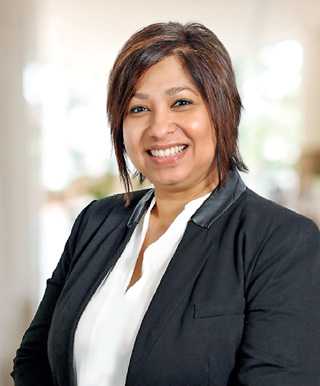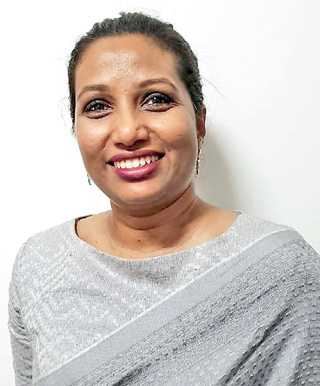Thursday Feb 26, 2026
Thursday Feb 26, 2026
Friday, 23 April 2021 00:02 - - {{hitsCtrl.values.hits}}

Jayomi Lokuliyana

Sandra De Zoysa

Shehani Seneviratne
By Dishani Senaratne
 |
| Thusha Mukunthan |
 |
| Thushara Wijewardena
|
Established in 2019 by the Ministry of Digital Infrastructure and Information Technology (MDIIT) and facilitated by the Information and Communication Technology Agency of Sri Lanka (ICTA), the Women’s Chamber for Digital Sri Lanka (WCD) strives to enable women in the digital economy through education, empowerment, entrepreneurship and engagement.
In this interview with the Daily FT, five Board Members of the WCD who are powerhouse women leaders, Jayomi Lokuliyana, Thushara Wijewardena, Shehani Seneviratne, Thusha Mukunthan and Sandra De Zoysa, share a wide range of thoughts and insights ranging from the background behind the launch of the WCD to the future plans to personal success stories and barriers.
Jayomi Lokuliyana – Chairperson, is the Co-founder and CEO of zMessenger – Sri Lanka’s leading digital solutions company providing a broad range of solutions in digital marketing strategy, digital advertising technology to serve connected customers.
Sandra De Zoysa – Forum Lead and Operations Head is the Group Chief Customer Officer of Dialog and the Chairperson of the Digital Customer Experience Expert Working Group for Axiata. Sandra is also a Director of Dialog Business Services.
Shehani Seneviratne – Forum Lead is the Director/Chief Operating Officer at 99X Technology. With 20+ years of experience in the IT industry, Shehani holds a BSc (Hons) degree in Information Systems from the Manchester Metropolitan University.
Thusha Mukunthan – Secretary is a Senior Manager at the Nations Trust Bank (NTB). Thusha is part of the Business Solutions Development team and Project Management Office (PMO) facilitating the business units within NTB to develop various digital products delivered to its customers.
Thushara Wijewardena – Vice Chairperson is a corporate executive with a proven track record in the IT industry both locally and internationally. Founded in 2018, she is currently the CEO of Aventude Ltd, a technology strategic consultation and solutions company based in Colombo and Stockholm.
Q: Can you explain the background behind the establishment of the Women’s Chamber for Digital Sri Lanka (WCD)?
Jayomi Lokuliyana: The WCD is a Cabinet approved national chamber established in 2019 by the Ministry of Digital Infrastructure and Information Technology (MDIIT) and facilitated by the Information and Communication Technology Agency of Sri Lanka (ICTA). The Board Members of the WCD comprise of a diverse group of female professionals ranging from experts in tech or Information and Communication Technology (ICT) to entrepreneurs and the academia.
A recent survey conducted by the ICTA was one of the immediate reasons behind the establishment of the WCD. This survey revealed there is a massive skills gap between the demand and supply in the ICT sector. In addition, this study revealed that only 21% women hold senior-level positions in the ICT sector. So, these eye-opening findings highlighted the need to increase the participation of women in tech and ICT.
On the other hand, Sri Lanka’s female population is nearly 52%. So, achieving gender balance at work place is very important because if women are left out it means that half of the population is left out and it reduces diversity and innovation.
The WCD aims to digitally disrupt the new generation but not merely the female workforce. Our primary objective is to upskill the digital literacy skills of women and girls so that they can contribute to the digital economy.
Q: What are the past and ongoing initiatives of the WCD?
Jayomi Lokuliyana: Even though the WCD was set up recently, we are proud to say that several initiatives have been successfully conducted despite the onset of the pandemic.
Working with development agencies is central to the ethos of the WCD. Therefore, we partnered with World Vision to assess the digital literacy skills of female-owned Small and Medium-scale enterprises (SMEs) across the country in areas like Kilinochchi, Chavakachcheri, Walapane and Mundalama. We identified that women face issues related to affordability, accessibility and safety while accessing the internet. It also showed that the digital literacy skills of women are not sufficient to enhance their products or even engage in internet-based transactions. Many women use social media for personal communication but have little idea of using the digital space to scale their businesses. So, these findings will be central to formulate our future activities.
In addition, the WCD in discussion with the Interact and Rotary Clubs to work closely with the youth so that social and cultural norms around technology could be dismantled. We have often seen that parents are more likely to buy a laptop for their son but not to their daughter. That is partly why the ICT industry is male-dominated and we have to educate teachers and career counselors to encourage girls to take up ICT at school-level.
We also conducted a few webinars since the outbreak of the pandemic that focused on gender diversity and gender imbalance.
Q: The outbreak of the pandemic pushed many of us further into a digital world. In what ways have thegender digital divide affected women during these unprecedented circumstances?
Thushara Wijewardena: There is a general belief that women possess limited knowledge and skills in ICT. The outbreak of the pandemic has led to a widespread online frustration of not having access to devices to get connected. Women are usually deemed vulnerable on the internet. Even the women who are relatively more educated rarely engage in online transactions. Very often, their partners do online transactions for women. So, the digital divide operates on many levels not just in relatively rural areas where there is a shortage of devices.
Q: What inspired you to take to ICT/tech? Why do you think more women should get into this sector?
Thushara Wijewardena: My entrance into this field is very unorthodox. No one in my family is into tech or ICT. I got a computer after completing my O/Ls. I was fascinated by it and that was when my interest sparkled and I have never looked back since.
Why I think more women should get into ICT is there is nothing you can do without ICT. Whatever the career that you wish to pursues, ICT skills are vital for you to climb up in the professional ladder.
If you take up ICT as a profession, it brings financial stability, when compared with other traditional jobs. You will probably work in a diverse working environment. As a result, you will be more open-minded. So, it will even change the way you see and come to terms with life.
Q: Sri Lanka’s female labour force participation rate has remained at a low rate. In such context, how do you identify the role and contribution of women in the tech/ICT today?
Shehani Seneviratne: Whether you are male or female, everyone is capable. That’s what I believe. However, the societal norms act as barriers in women’s contribution to digital economy.
The ICT is the fastest growing industry in Sri Lanka. So, we cannot have females lagging behind. There is a huge misconception that all ICT professionals are software engineers. But there are so many different disciplines to be explored, not just engineering.
On the other hand, even if women join this industry, they drop out especially after getting married. So, we have to support women to sustain their jobs not necessarily because this a lucrative industry but a thriving industry.
Q: In what ways do you think the new normal of working from home will impact the lives of women?
Shehani Seneviratne: Had we waited for the private sector to evolve into working from home, it would have never happened. We were pushed into it and now most people are quite used to it. Before the pandemic, working from home was nearly impossible in most work environments.
But now most people especially women benefit from working from home because it allows you to have more life-work balance. This is a good opportunity for all women, not just women in tech or ICT.
Q: What are some of the challenges that you have faced/are facing as a woman in tech/ICT?
Sandra De Zoysa: If you are a woman and want to be heard by male counterparts, you need to be doubly prepared. At times, you are not taken seriously simply because you are a woman. Even our failures seem bigger to the world. Being a career woman, I always put in a little extra effort.
When I initially joined the telecommunications industry, I was the only female. I was told ‘you’re too young’. In my second job, I returned to work after one month following the birth of my daughter. However, I didn’t give up despite all the challenges that I faced. I’m thankful for the hard and tough times because today I’m a globally recognised figure in the sphere of Telco and Digital Customer Experience Management.
Q: How important it is to avoid tokenism when promoting inclusivity of women at workplace?
Sandra De Zoysa: In Sri Lanka, female representation is low from the parliament to private sector. But, nearly half of the population is female. Then, we’ve got to take extra measures to ensure female representation. How far can we go if we leave out women? The corporate sector should be willing to take risks and stop paying lip-service to gender equality. We also need to promote women-friendly work environments. If the boss sets an example, the team will fall into place. I feel all women should have two mentors, ideally a man and a woman who will open your mind to different perspectives.
I would like to see that women of today don’t go through the unpleasant experiences that I faced in the past. I think I owe it to other women because I too have a daughter. That’s what keeps me going especially through initiatives like the WCD.
Q: How do we ensure engagement of men and boys as allies to women’s rights and representation of women in the workplace?
Thusha Mukunthan: I consider myself very lucky because the companies that I worked for didn’t endorse gender discrimination.
Generally, women are expected to adjust in keeping with different roles such as daughters, wives, mothers and working women etc. Men, on the contrary, are rarely seen in such light.
One of the main reasons that I remained in the corporate world was the flexibility given to me by a male boss. I used to work even during weekends because I was more available during that period. I think when you allow people to work the way they want, the commitment will be higher.
It’s heartening to see that social norms based on gender are changing. When talking about women’s rights or representation, it shouldn’t be something seasonal. We cannot empower women and girls in isolation.
Q: What are the future plans of the WCD?
Thusha Mukunthan: The roadmap of the WCD is underpinned by acceleration of women’s participation in the digital economy. The WCD is currently engaged in talks to partner with a research body so that it will add more diversity to the Board of Directors.
Most people have already got a taste of the digital world thanks to the pandemic. These little things matter when you want to make big differences.
But, the WCD does not intend to do everything. Our objective is to be an aggregator to help women become connected. For this purpose, plans are afoot to conduct micro-finance support programs for women in collaboration with World Vision. In addition, supporting university students through competitions like Hackathon will be carried out. We’re also exploring to reach out to school-going girls to provide them role models. As part of this, teacher training programs are on the cards.